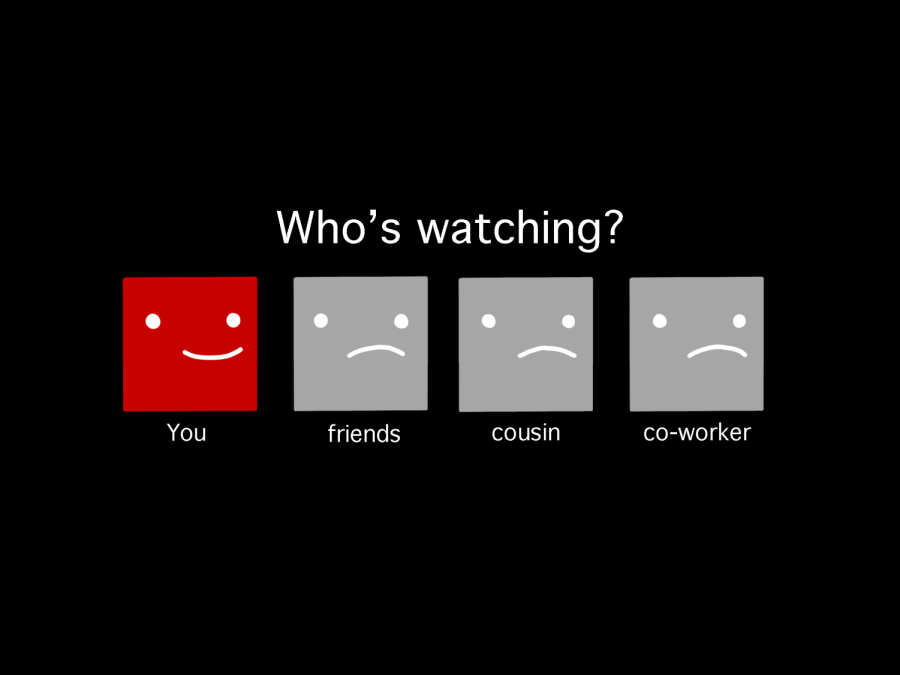Netflix subscribers deem new controversial anti-sharing policy unfair
Netflix announced a new password-sharing policy Feb. 8 in Canada, New Zealand, Portugal and Spain, and it is expected to spread to the U.S. by the end of March. This policy will affect frequent travelers, divorced families and, perhaps most notably, college students who utilize their family’s account but don’t live with them.
March 26, 2023
After a long day of class, tuning into a Netflix show sounds like the perfect evening for many students, but the ever-popular streaming platform just made a controversial business move — and it is impacting college students at a high rate.
Netflix announced a new password-sharing policy Feb. 8 in Canada, New Zealand, Portugal and Spain, and it is expected to spread to the U.S. by the end of March. This new policy requires users to set a primary household location, and those outside of the location cannot use the account unless they connect their device to the main locale’s Wi-Fi network once every 30 days. Those on the standard or premium plan can add up to two people for an additional charge. Basing an estimate on the new Canadian policy, websites like CNET believe that each added sub-account in the U.S. would cost an additional $7.50. However, those on the basic or ad-supported plan will not be able to add additional members to their accounts.
This policy will affect frequent travelers, divorced families and, perhaps most notably, college students who utilize their family’s account but don’t live with them. A 2022 Horowitz Research study found that 71% of 18 to 24-year-olds watch Netflix each week. And many frequent Netflix watchers at Northeastern had opinions on the topic.
In a poll sent out via social media, 88.2% of Northeastern respondents said the new policy is exclusionary to too many groups and is unnecessary, while 11.8% of respondents said it is in the company’s right to get paid from all their users.
Niamh Burke is a second-year human services and sociology major and is one of many students who use a shared password to access someone else’s account.
“It’s a bit of a sad moment because I won’t be able to use that person’s Netflix anymore so I won’t be able to use the platform,” Burke said. “But I do get where they’re coming from and it’s a pretty good marketing ploy.”
Hannah Smolyar, an undeclared first-year student, said she would stop using Netflix if the policy is established in the United States.
“Netflix already has such a limited selection of shows that if I wasn’t able to use my family’s account, I don’t think there would be any incentive to make my own account,” Smolyar said.
Some are adamant that this is a necessary move by Netflix. In recent years, Netflix has lost subscribers, so it makes sense to want to fix these loopholes. In the second quarter of 2022, the company lost 970,000 subscribers. This could be due to many factors, with one common suspicion being increased competition from streaming services that offer a wider variety of content.
Although many would agree Netflix is detaching itself from consumers, Netflix believes that to get its subscriber count back to a good place, it will need to monetize its viewing value. Analysts at Cowen Inc. estimated from a 2022 survey of Netflix password sharers that it could make an additional $721 million in the U.S. and Canada in 2023 with the new policy. There are approximately 30 million password sharers across the two countries and it is clear that it would be financially advantageous for Netflix to charge to continue sharing or encourage people to start their own accounts.
“From a company standpoint, this is a smart move. But this new policy is ruining their reputation and image in many ways,” said Annika Sunkara, a first-year journalism major. “Users were extremely mad on social media, which is surprising because Netflix has had such a good reputation for so long.”
A possible solution for college students would be for them to get a Netflix account with their roommates or people on their floor. And for Netflix users more broadly, there are a few options to think through before the policy is implemented in the U.S. at the end of March. Password sharers will have to decide if they want to pay for the addition of a sub-account, get their own account or leave the platform altogether. And of course, consumers can still utilize the many other streaming services that have relaxed policies surrounding password sharing like Hulu, Disney+ and Peacock.
“Netflix is forcing a lot of people to have uncomfortable conversations to make their friends and family members get off their plans,” Sunkara said. “However, I think that Netflix has a monopoly over the streaming industry so I would be surprised to see a huge drop in subscribers because of the policy.”
In March 2017, Netflix tweeted, “Love is sharing a password” — it’s safe to say their meaning of love has changed.


















